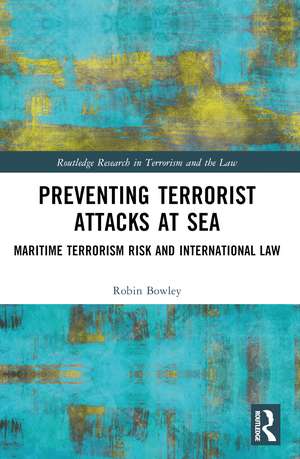Preventing Terrorist Attacks at Sea: Maritime Terrorism Risk and International Law: Routledge Research in Terrorism and the Law
Autor Robin Bowleyen Limba Engleză Paperback – 26 aug 2024
After discussing the overlaps and distinctions between piracy and maritime terrorism, this book considers how the International Ship and Port Facility Security Code, and other vessel identification and tracking measures in the 1974 International Convention for the Safety of Life at Sea, would be likely to reduce the risk of terrorist attacks at sea. It explains how the 1982 United Nations Convention on the Law of the Sea is less than clear on the powers of states to protect offshore installations, submarine cables and pipelines from interference by terrorists. In light of these uncertainties, it considers how the 2005 Protocol to the Convention for the Suppression of Unlawful Acts Against Maritime Navigation, the doctrine of necessity and states’ inherent self-defence rights might apply in the maritime security context. A significant contribution of the book is the formulation of the Maritime Terrorism Threat Matrix, which provides a structured framework for examining how maritime terrorism incidents have occurred, and might occur in the future. The book also examines the relevant national maritime security legislation for preventing maritime terrorist attacks in the United Kingdom and in Australia. The book concludes by formulating guidelines for the unilateral interdiction of suspected terrorist vessels in exceptional circumstances, and recommending priorities for governments and international maritime industries to focus on in order to reduce the risk for terrorist attacks at sea.
It will be of interest to those working in the areas of Law and Terrorism, Law of the Sea, Maritime Law and Insurance and International Law.
| Toate formatele și edițiile | Preț | Express |
|---|---|---|
| Paperback (1) | 312.81 lei 22-36 zile | +27.73 lei 5-11 zile |
| Taylor & Francis – 26 aug 2024 | 312.81 lei 22-36 zile | +27.73 lei 5-11 zile |
| Hardback (1) | 894.53 lei 43-57 zile | |
| Taylor & Francis – 23 dec 2022 | 894.53 lei 43-57 zile |
Preț: 312.81 lei
Nou
Puncte Express: 469
Preț estimativ în valută:
59.86€ • 62.65$ • 49.82£
59.86€ • 62.65$ • 49.82£
Carte disponibilă
Livrare economică 10-24 martie
Livrare express 21-27 februarie pentru 37.72 lei
Preluare comenzi: 021 569.72.76
Specificații
ISBN-13: 9781032124209
ISBN-10: 1032124202
Pagini: 316
Ilustrații: 6
Dimensiuni: 156 x 234 x 20 mm
Greutate: 0.59 kg
Ediția:1
Editura: Taylor & Francis
Colecția Routledge
Seria Routledge Research in Terrorism and the Law
Locul publicării:Oxford, United Kingdom
ISBN-10: 1032124202
Pagini: 316
Ilustrații: 6
Dimensiuni: 156 x 234 x 20 mm
Greutate: 0.59 kg
Ediția:1
Editura: Taylor & Francis
Colecția Routledge
Seria Routledge Research in Terrorism and the Law
Locul publicării:Oxford, United Kingdom
Public țintă
Academic and PostgraduateCuprins
Lists of figures
List of tables
List of abbreviations
Chapter 1: Introduction
Chapter 2: The threat of contemporary terrorism in the maritime domain
Chapter 3: The SOLAS Convention maritime security and vessel identification and tracking arrangements
Chapter 4: Preventing the terrorist targeting of ships
Chapter 5: Preventing the offensive utilisation of vessels by terrorists
Chapter 6: National measures and proposed exceptional circumstances guidelines for preventing terrorist attacks at sea
Chapter 7: Conclusion and future recommendations
Appendix A: ‘Designation terrorist groups by the United Nations and by selected states as at 1 March 2022
Appendix B: Chronology of successful maritime terrorism attacks 1968 – 2020’
Appendix C: Status of international agreements as at 1 March 2022
Bibliography
Index
List of tables
List of abbreviations
Chapter 1: Introduction
Chapter 2: The threat of contemporary terrorism in the maritime domain
Chapter 3: The SOLAS Convention maritime security and vessel identification and tracking arrangements
Chapter 4: Preventing the terrorist targeting of ships
Chapter 5: Preventing the offensive utilisation of vessels by terrorists
Chapter 6: National measures and proposed exceptional circumstances guidelines for preventing terrorist attacks at sea
Chapter 7: Conclusion and future recommendations
Appendix A: ‘Designation terrorist groups by the United Nations and by selected states as at 1 March 2022
Appendix B: Chronology of successful maritime terrorism attacks 1968 – 2020’
Appendix C: Status of international agreements as at 1 March 2022
Bibliography
Index
Notă biografică
Robin Bowley is a Lecturer with the Faculty of Law at the University of Technology Sydney, Australia.
Descriere
Discussing the overlaps and distinctions between piracy and maritime terrorism, this book considers how the International Ship and Port Facility Security Code, and other vessel identification and tracking measures in the 1974 International Convention for the Safety of Life at Sea, would be likely to reduce the risk of terrorist attacks at sea.

















